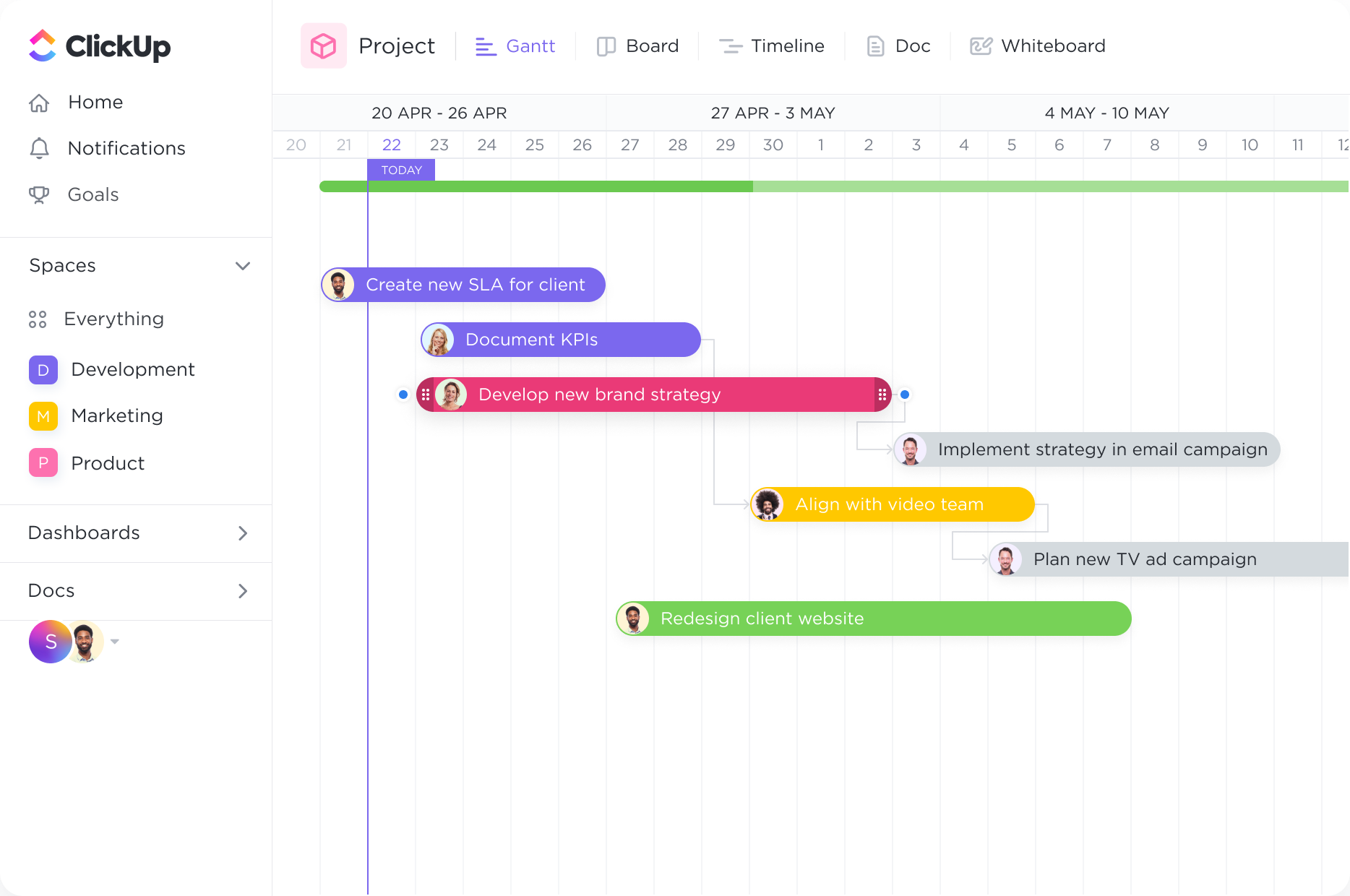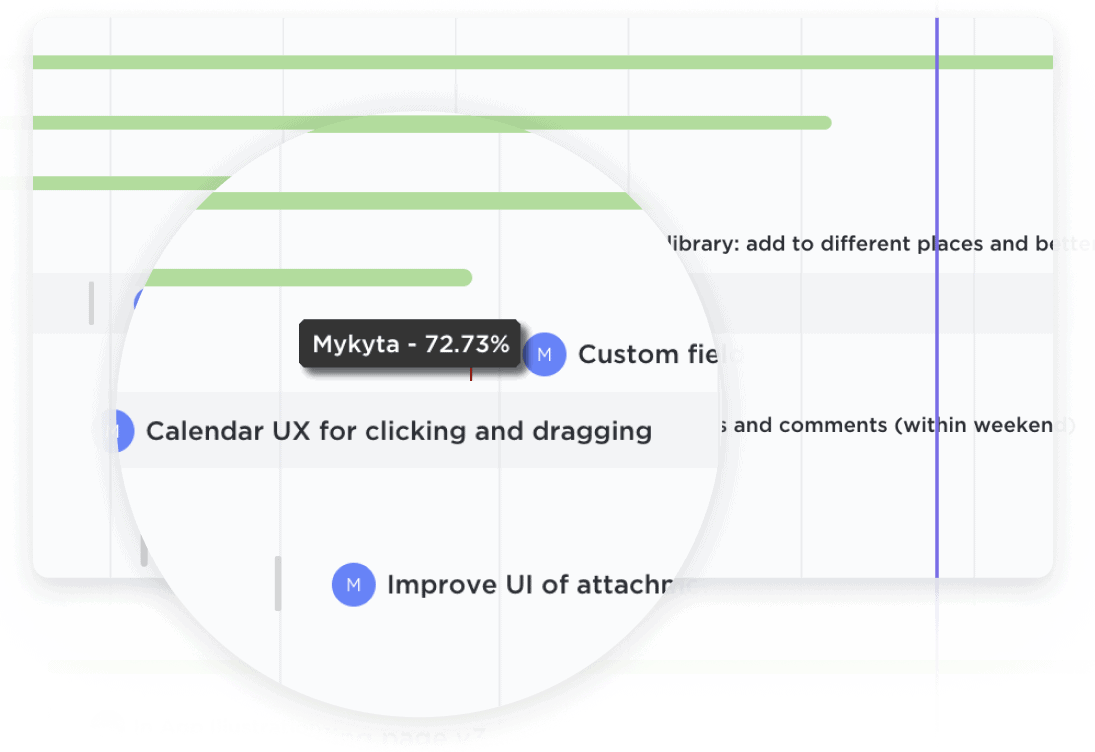Stay ahead of every deadline.
With the Gantt chart's dynamic timeline, you can easily schedule tasks, keep up with project progress, manage deadlines, and handle bottlenecks.
Streamline your retail store planning process with ClickUp's powerful Gantt Chart software. Plan, organize, and execute your projects with ease using ClickUp's intuitive interface and robust features. From visualizing timelines to tracking progress, ClickUp empowers retail store planners to stay on top of their projects and deliver results efficiently. Say goodbye to manual planning and hello to ClickUp's Gantt Chart software for retail store planners.
Free forever.
No credit card.

Trusted by the world’s leading businesses
With the Gantt chart's dynamic timeline, you can easily schedule tasks, keep up with project progress, manage deadlines, and handle bottlenecks.
Easily update projects with a simple drag-and-drop action to collaborate amongst your team in real-time. Dynamic progress percentages provide a detailed snapshot.

When opening a new retail store or renovating an existing one, Gantt charts can be used to plan and track all the necessary tasks and milestones. This includes activities such as securing permits, designing the store layout, ordering inventory, hiring staff, and completing construction work. By visualizing the project timeline, deadlines, and dependencies, Gantt charts help ensure that the store opens or reopens on schedule, minimizing any potential disruptions to the business.
Gantt charts are invaluable tools for planning and executing visual merchandising strategies and product launches. They allow retail store planners to outline the necessary steps, allocate tasks to team members, and track progress. This includes activities such as designing window displays, arranging product placements, creating marketing materials, and coordinating promotional events. Gantt charts provide a clear overview of the project, ensuring that all components are completed in a coordinated and timely manner.
Efficient inventory management is crucial for retail stores to meet customer demand while minimizing stockouts and overstock situations. Gantt charts can be used to plan and monitor inventory-related activities, such as stock replenishment, order processing, and stocktaking. By visualizing these tasks and their timelines, retail store planners can optimize resource allocation, ensure timely stock availability, and prevent inventory-related issues that could impact sales and customer satisfaction.
Retail stores often run seasonal sales and promotions to attract customers and boost sales. Gantt charts can help retail store planners meticulously plan and coordinate these activities. This includes setting the start and end dates for promotions, designing marketing campaigns, creating promotional materials, and coordinating in-store displays. By visualizing the timeline and interdependencies of these tasks, Gantt charts enable retail store planners to execute successful seasonal sales and promotions, maximizing their impact on revenue.
To maintain a pleasant shopping experience and ensure the store's functionality, regular maintenance and upgrades are necessary. Gantt charts can be used to plan and schedule tasks such as cleaning, equipment maintenance, and store layout changes. By visualizing these activities, retail store planners can allocate resources effectively, minimize disruptions to store operations, and ensure that maintenance tasks are completed in a timely manner. Gantt charts provide a comprehensive overview of the maintenance and upgrade schedule, allowing for efficient planning and execution.
Gantt chart software can help retail store planners by providing a visual representation of project timelines, tasks, and dependencies. It allows for efficient resource allocation and tracking of progress, ensuring timely completion of tasks. This enables retail store planners to effectively manage and prioritize projects, optimize store layouts, and coordinate with various stakeholders, resulting in streamlined project management and improved store planning outcomes.
Yes, Gantt chart software can be integrated with other retail planning tools to streamline the overall planning process. This integration allows for seamless data transfer, synchronization of timelines and tasks, and enhanced collaboration among team members. By combining Gantt charts with other retail planning tools, retailers can optimize resource allocation, improve communication, and make more informed decisions to drive business growth.
Yes, Gantt chart software can provide real-time updates and notifications to retail store planners, allowing them to easily monitor project progress, track deadlines, and stay informed about any changes or delays.